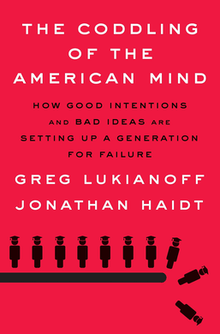The Coddling of the American Mind
The Coddling of the American Mind: How Good Intentions and Bad Ideas Are Setting Up a Generation for Failure is a 2018 book by Greg Lukianoff and Jonathan Haidt. It is an expansion of a popular essay the two wrote for The Atlantic in 2015. Lukianoff and Haidt argue that overprotection is having a negative effect on university students and that the use of “trigger warnings” and “safe spaces” does more harm than good.
 | |
| Authors | Greg Lukianoff Jonathan Haidt |
|---|---|
| Audio read by | Jonathan Haidt |
| Country | United States |
| Language | English |
| Subject | Psychology |
| Publisher | Penguin Books |
Publication date | September 4, 2018 |
| Media type | |
| Pages | 352 |
| ISBN | 978-0735224896 |
| Website | www |
Overview
Lukianoff and Haidt argue that many problems on campus have their origins in three "great untruths" that have become prominent in education: "What doesn’t kill you makes you weaker"; "always trust your feelings"; and "life is a battle between good people and evil people". The authors state that these three "great untruths" contradict modern psychology and ancient wisdom from many cultures.[1]
The book goes on to discuss microaggressions, identity politics, "safetyism", call-out culture and intersectionality.[1] The authors define safetyism as a culture or belief system in which safety (which includes "emotional safety") has become a sacred value, which means that people become unwilling to make trade-offs demanded by other practical and moral concerns. They argue that embracing the culture of safetyism has interfered with young people’s social, emotional, and intellectual development.[2]
Continuing on to discuss contemporary partisanship or the "rising political polarization and cross party animosity". They state that the left and right are "locked into a game of mutual provocation and reciprocal outrage".[2]:125
The authors call on university and college administrators to identify with freedom of inquiry by endorsing the Chicago principles on free speech[2]:255-257 through which university and colleges notify students in advance that they do not support the use of trigger warnings or safe spaces.[3] They suggest specific programs, such as LetGrow, Lenore Skenazy's Free Range Kids, teaching children mindfulness and the basics of cognitive behavioral therapy (CBT).[2]:241 They encourage a charitable approach to the interpretations of other peoples' statements instead of assuming they meant offense.
In their conclusion, the authors write that there will be positive changes in the near future as small groups of universities "develop a different sort of academic culture—one that finds ways to make students from all identity groups feel welcome without using the divisive methods." They say that "market forces will take care of the rest" as "applications and enrollment" surge at these schools.[2]:268
Release
The book reached number eight on The New York Times Hardcover Nonfiction best-sellers list.[4] It spent four weeks on the list.[5]
Reception
Edward Luce of the Financial Times praised the book, saying the authors "do a great job of showing how 'safetyism' is cramping young minds."[6]
Writing for The New York Times, Thomas Chatterton Williams praised the book's explanations and analysis of recent college campus trends as "compelling".[7]
Writing for The Washington Post, Michael S. Roth, president of Wesleyan University, gave the book a mixed review, questioning the book's assertion that students today are "disempowered because they’ve been convinced they are fragile". Roth however said that the authors' "insights on the dangers of creating habits of "moral dependency" are timely and important".[8]
Moira Weigel, writing for The Guardian, says that Lukianoff and Haidt, who live in safe spaces of Ted Talks and think tanks, where they are "genteel crusaders" against political correctness, and who have not experienced "discrimination and domination" themselves, "insist that the crises moving young people to action are all in their heads". The authors say that the students suffer from pathological cognitive distortions that fuel their activism and can be corrected by using self-help methods the authors provide based on cognitive behavioural therapy (CBT).[1] She says that the authors have created their own speech codes, which includes the cant of progress.[1]
References
- Weigel, Moira (20 September 2018). "The Coddling of the American Mind review – how elite US liberals have turned rightwards". The Guardian. Retrieved 18 February 2019.
- Greg Lukianoff; Jonathan Haidt (2018). The Coddling of the American Mind: How Good Intentions and Bad Ideas Are Setting Up a Generation for Failure. Penguin Publishing Group. ISBN 978-0-7352-2489-6.
- Kingkade, Tyler (15 May 2015). "Purdue Takes A Stand For Free Speech, No Matter How Offensive Or Unwise". Huffington Post. Retrieved 29 March 2017.
- "Hardcover Nonfiction Books - Best Sellers". The New York Times. 23 September 2018. Retrieved 18 February 2019.
- "Hardcover Nonfiction Books - Best Sellers". The New York Times. 18 November 2018. Retrieved 18 February 2019.
- Luce, Edward. "Subscribe to read". Financial Times. Retrieved 18 February 2019.
- Williams, Thomas Chatterton (27 August 2018). "Does Our Cultural Obsession With Safety Spell the Downfall of Democracy?". The New York Times. Retrieved 18 February 2019.
- Roth, Michael S. (7 September 2018). "Have parents made their kids too fragile for the rough-and-tumble of life?". The Washington Post. Retrieved 18 February 2019.